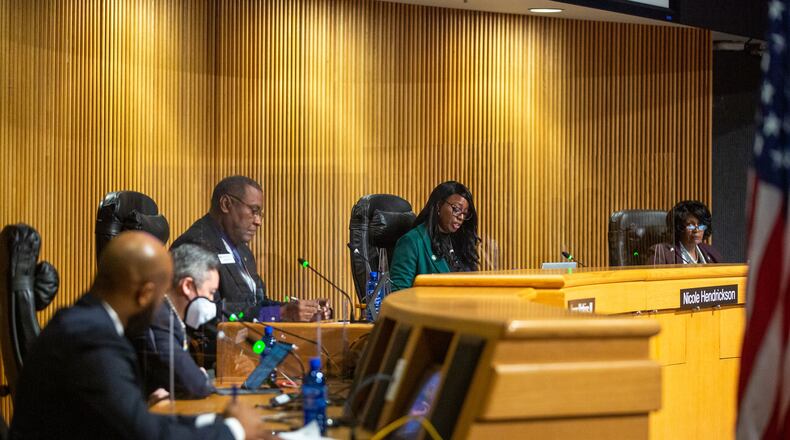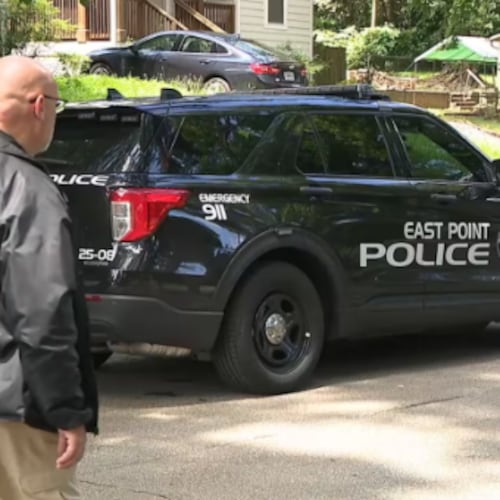Gwinnett County officials on Monday enacted a 60-day ban on new billboard applications, following a civil lawsuit brought by a private company against the county.
County Attorney Mike Ludwiczak told the Board of Commissioners during a Monday meeting that there may be inconsistencies in the government’s rules about oversized signs.
Vision Outdoor Media LLC alleged in a complaint filed in Gwinnett County Superior Court in July that its applications for 21 billboards were wrongfully denied by the county’s planning department.
The complaint claims that Dennis DuPont, one of the company’s owners, submitted the first of 21 applications in June to the department, which incorrectly classified the billboard as a “primary ground sign” rather than an “oversized sign.”
The way that signs are classified affects the regulations that must be followed. According to the complaint, county planner James Hornbeck denied the application since the sign wouldn’t meet the requirements for a primary ground sign.
The plaintiff claims that the billboards should be considered oversized signs based on the definition given in the county’s sign ordinance. An oversized sign is “a ground sign which exceeds 30 feet in sign height and/or 300 square feet of sign surface area,” according to the ordinance.
DuPont returned to the planning department later that day to submit the rest of the billboard applications. The complaint claims that Hornbeck told the owner that the 20 other applications would be denied for the same reason as the first.
Vision Outdoor Media tried to appeal the decision 10 days later to the county’s Zoning Board of Appeals. The complaint alleges that Hornbeck told the company’s legal counsel that the county wouldn’t accept the appeal and that resubmissions would result in subsequent denials.
The company has since submitted new applications, Webb said, which were still pending as of Tuesday. Vision Outdoor Media will likely drop the lawsuit if the applications are accepted, he said.
“Really, they just want to do business,” said Adam Webb, an attorney representing the company. “If the applications are approved, there is no reason for a lawsuit. They do not want to litigate.”
The plaintiff argues in the complaint that the county lacks legal justification to deny the applications. It also alleges that the denials “defy” the language of the county’s sign ordinances and limit free speech.
The decision to temporarily stop accepting new applications “in no way concedes these claims are valid,” Ludwiczak told the commissioners on Monday.
The moratorium will allow staff members to look at the ordinances that deal with billboards, Ludwiczak said. It will go through September 10 or until commissioners make changes to the regulations.
Last amended in 2019, the county’s sign ordinance generally prohibits oversized signs. But the county’s unified development ordinance — which supersedes the sign ordinance in cases of conflicting language — allows them in certain zoning districts.
Gwinnett County officials declined Wednesday to give further comment to The Atlanta Journal-Constitution about the moratorium, given the pending litigation.
Webb said the temporary ban on new billboard applications should not affect the lawsuit nor the second set of applications filed by the company.
If granted the go-ahead, the company would place the billboards along several traffic-heavy roads around unincorporated Gwinnett County, such as Stone Mountain Highway, Duluth Highway, Pleasant Hill Road and Killian Hill Road.
Vision Outdoor Media, a Florida-based company founded in 2013 that specializes in outdoor advertising, sued Cobb County a few years ago over denied applications for LED billboards. A settlement resulted in the company installing eight billboards instead of its initial request to install 22.
“Gwinnett County is underserved by signage that would let small, local businesses direct customers to their shops, restaurants, et cetera,” Webb said. “... Our position is that this is doing a great disservice to those local businesses, who are going to be the ones advertising on these signs.”
AJC Staff Writer Arielle Kass contributed to this report.
About the Author
Keep Reading
The Latest
Featured



